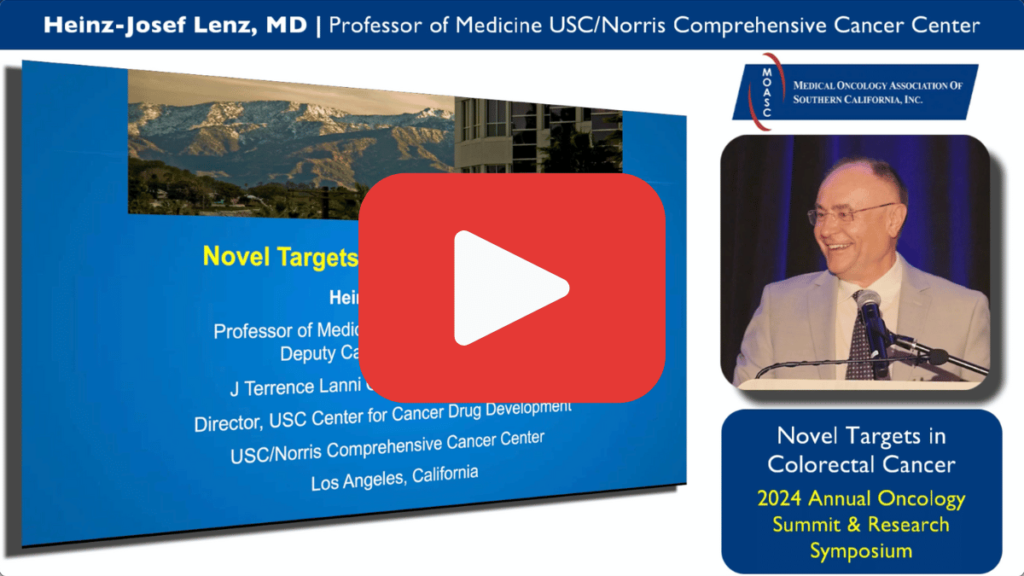In the rapidly evolving field of oncology, colorectal cancer (CRC) represents a significant area of research and clinical development. Innovations in genetic profiling and targeted therapies have led to considerable advancements in the treatment of CRC, offering new hope and improved outcomes for patients. This article, grounded in the comprehensive data presented by Heinz-Josef Lenz, MD, from the USC Center for Cancer Drug Development at the 2024 MOASC Annual Oncology Summit & Research Symposium in Newport Beach California, aims to provide oncologists with an in-depth overview of the current state and future directions in CRC treatment.
[EXCLUSIVE VIDEO with 34 SLIDES] Heinz-Josef Lenz, MD – 2024 MOASC Annual Oncology Summit & Research Symposium – Advances in Colorectal Cancer
Comprehensive Understanding of Genomic Markers in CRC
The landscape of CRC treatment has been profoundly influenced by the identification and understanding of genomic markers. These markers serve not only as prognostic indicators but also as pivotal points for therapeutic intervention. Among them, RAS mutations stand out due to their prevalence and impact on treatment efficacy, particularly regarding anti-EGFR therapies. The distinction between RAS wild-type and mutant forms of CRC is crucial, as it dictates the responsiveness to these targeted therapies.
Moreover, the discovery of PIK3CA/PTEN mutations, although present in a smaller fraction of the CRC population, opens additional avenues for targeted treatment. The exploration of these genomic markers underscores the nuanced approach required in the management of CRC, where personalized medicine is increasingly becoming the standard of care. The ongoing challenge lies in extending the benefits of targeted therapies to a broader group of patients, through the identification of new actionable mutations and the development of corresponding inhibitors.
Novel Approaches in Targeting KRAS Mutations
KRAS mutations, particularly the G12C mutation, have emerged as a focal point in the quest for novel CRC treatments. The prognosis for patients with KRAS G12C mutations has historically been poor, necessitating the development of targeted therapies. The KRYSTAL-1 study, focusing on adagrasib, a KRASG12C inhibitor, represents a significant milestone in this endeavor. Results from this study highlight the potential of adagrasib to improve outcomes for patients harboring the KRAS G12C mutation, whether used as monotherapy or in combination with cetuximab.
These findings are part of a broader trend towards targeting specific genetic alterations in CRC, which has the potential to transform the therapeutic landscape significantly. As more data emerge, the role of KRAS G12C inhibitors, alongside other targeted therapies, is expected to become increasingly central in CRC treatment protocols.
Advancements in Immunotherapy for MSI-High CRC
The treatment of MSI-high CRC with immunotherapy exemplifies the shift towards leveraging the immune system in cancer therapy. The use of nivolumab in combination with ipilimumab has set a new standard for the first-line treatment of this CRC subtype, demonstrating significant improvements in progression-free survival compared to traditional chemotherapy. This success underscores the importance of immunotherapy in the management of CRC, particularly for patients with MSI-high tumors, who traditionally had limited treatment options.
Targeting HER2 in CRC
HER2 amplification in CRC, while relatively rare, presents another opportunity for targeted therapy. Recent developments in this area, including the use of tucatinib and trastuzumab deruxtecan (T-DXd), have shown promising results. These therapies offer a glimpse into the future of CRC treatment, where targeted interventions can provide substantial benefits to patients with specific genetic profiles.
The ongoing challenge in this area is to refine patient selection and optimize combination regimens to enhance efficacy and manage toxicity. As understanding of the molecular underpinnings of HER2-positive CRC deepens, the potential for more effective and personalized treatments grows.
Novel Immunotherapies for MSS CRC and Future Perspectives
The development of novel immunotherapies for MSS CRC highlights the expanding role of immune-based treatments in cancer care. Agents such as botensilimab and balstilimab have shown activity in tumors traditionally considered “immune-cold,” indicating a potential paradigm shift in the treatment of this challenging CRC subset.
Looking ahead, the integration of genetic testing, liquid biopsies, and multi-omics analysis into clinical practice is expected to revolutionize CRC treatment further. These technologies promise to enhance our understanding of tumor biology, improve the accuracy of prognosis, and guide the selection of the most effective therapies for individual patients. The future of CRC treatment is poised on the cusp of a new era, marked by unprecedented personalization and effectiveness of therapy.
In conclusion, the field of CRC treatment is undergoing rapid transformation, driven by advancements in genetic profiling, targeted therapies, and immunotherapy. For oncologists, staying informed about these developments is essential to provide the best possible care for their patients. The ongoing research and clinical trials promise to further refine our approach to CRC, ultimately leading to more effective treatments and improved patient outcomes.
Reference Links:
Sotorasib and Panitumumab Versus Investigator’s Choice for Participants With Kirsten Rat Sarcoma (KRAS) p.G12C Mutation (CodeBreak300): https://www.clinicaltrials.gov/study/NCT05198934
Divarasib plus cetuximab in KRAS G12C-positive colorectal cancer: a phase 1b trial: https://www.nature.com/articles/s41591-023-02696-8
OncologyTube Links:
CodeBreaK300 Update HRQoL in mCRC sotorasib + panitumumab vs. T/T or regorafenib: https://oncologytube.com/codebreak300-update-hrqol-in-mcrc-sotorasib-panitumumab-vs-t-t-or-regorafenib/
Sotorasib + Panitumumab in KRAS G12C CodeBreak 300 Phase 3 Trial: https://oncologytube.com/sotorasib-panitumumab-in-kras-g12c-codebreak-300-phase-3-trial/

